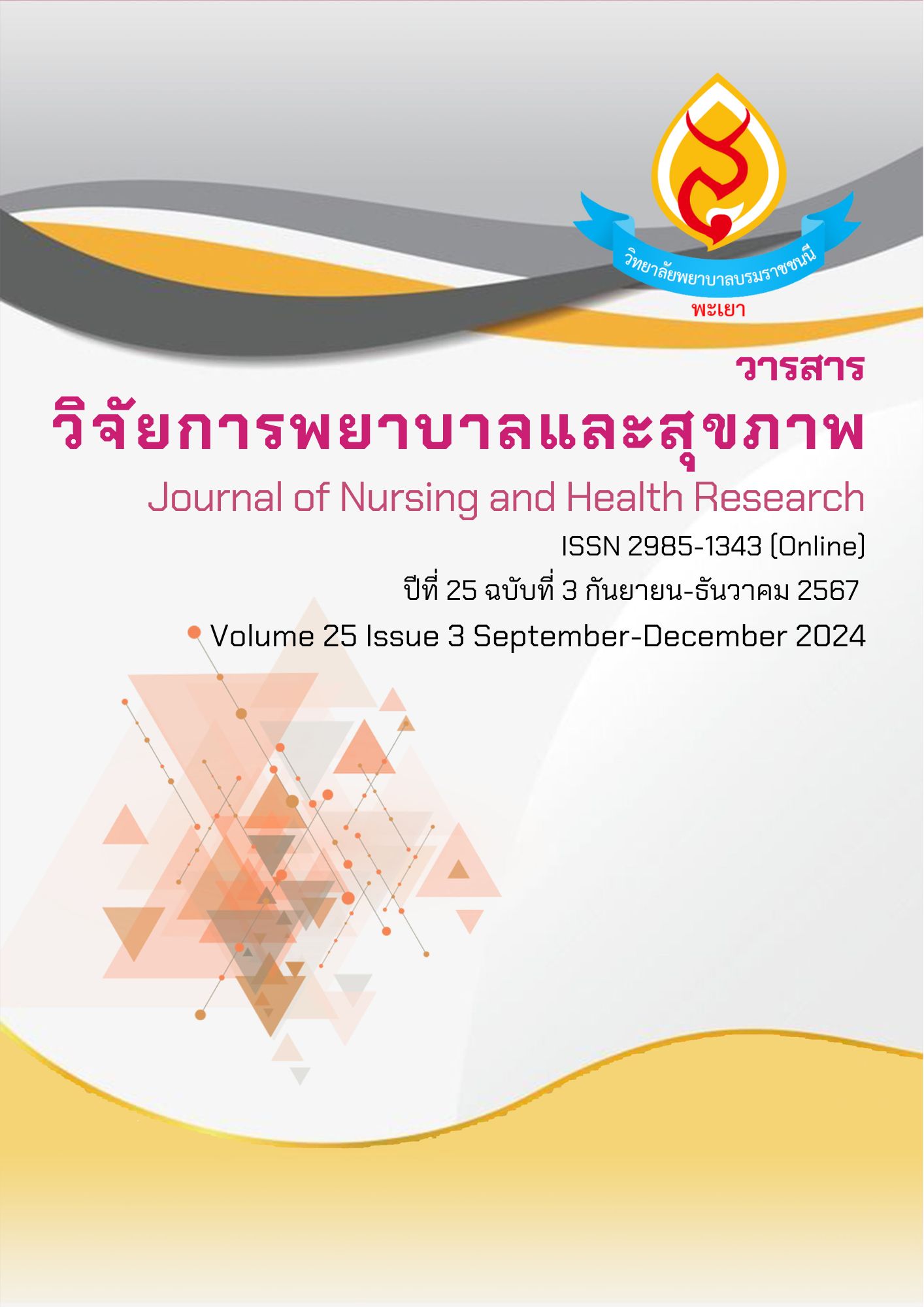ผลของโปรแกรมการจัดการตนเองต่อพฤติกรรมการควบคุมโรคและระดับน้ำตาลในเลือดของผู้ป่วยโรคเบาหวานชนิดที่ 2
คำสำคัญ:
ผู้ป่วยโรคเบาหวานชนิดที่ 2, โปรแกรมการจัดการตนเอง, พฤติกรรมการควบคุมโรคบทคัดย่อ
โรคเบาหวานเป็นโรคเรื้อรังที่เป็นปัญหาสำคัญด้านสาธารณสุข การส่งเสริมให้ผู้ป่วยมีการจัดการตนเอง ในการควบคุมโรคเบาหวานจึงเป็นสิ่งสำคัญ การวิจัยนี้เป็นวิจัยกึ่งทดลองแบบสองกลุ่มวัดผลก่อนและหลังการทดลอง มีวัตถุประสงค์เพื่อศึกษาผลของโปรแกรมการจัดการตนเองต่อพฤติกรรมการควบคุมโรคและระดับน้ำตาลในเลือดของผู้ป่วยโรคเบาหวานชนิดที่ 2 โรงพยาบาลลี้ จังหวัดลำพูน กลุ่มตัวอย่างเป็นผู้ป่วยโรคเบาหวานชนิดที่ 2 ที่ไม่สามารถควบคุมระดับน้ำตาลได้ จํานวน 70 ราย แบ่งเป็น กลุ่มทดลองจำนวน 35 ราย และกลุ่มควบคุม จำนวน 35 ราย เครื่องมือที่ใช้ประกอบด้วย โปรแกรมการจัดการตนเอง แบบประเมินพฤติกรรมการควบคุมโรคเบาหวานด้านการรับประทานอาหารและการใช้ยา วิเคราะห์ข้อมูลโดยใช้สถิติเชิงพรรณนาและการทดสอบค่า ที ระหว่างกลุ่ม ผลการวิจัย พบว่า หลังได้รับโปรแกรมการจัดการตนเอง กลุ่มทดลองมีคะแนนเฉลี่ยด้านพฤติกรรมการควบคุมโรค ด้านการรับประทานอาหารและการใช้ยา สูงกว่ากลุ่มควบคุมอย่างมีนัยสำคัญทางสถิติ (p<.001) และค่าเฉลี่ยระดับน้ำตาลในเลือดต่ำกว่า กลุ่มควบคุมอย่างมีนัยสำคัญทางสถิติ (p<.001) ผลการศึกษานี้แสดงให้เห็นว่าโปรแกรมการจัดการตนเองสามารถส่งเสริมพฤติกรรมการควบคุมโรคและลดระดับน้ำตาลในเลือดของผู้ป่วยโรคเบาหวานชนิดที่ 2 และบุคลากรสุขภาพสามารถนำโปรแกรมการจัดการตนเองไปใช้เพื่อส่งเสริมให้ผู้ป่วยโรคเบาหวานมีการจัดการตนเองด้านการรับประทานอาหารและการใช้ยาในคลินิกเบาหวานในโรงพยาบาลชุมชน เพื่อควบคุมโรคเบาหวานได้
เอกสารอ้างอิง
Chomwong, P., Banchonhattakit, P., & Chusak, T. (2024). Effects of using a self-management program for pateints with type 2 diabetes uncontrollable at Khoksalung subdistrict, Phatthana Nikhom district, Lopburi province. Research and Development Health System Journal, 17(2), 240–253. (in Thai)
Creer, T. L. (2000). Self-management of chronic illness. In M. Boekaerts, P. R. Pintrich, & M. Zeidner (Eds.), Handbook of self-regulation. (p.601–629). Academic Press.
Diabetes Association of Thailand. (2023). Clinical practice guideline for diabetes 2023. Diabetes Association of Thailand, Endocrine Society of Thailand., Department of Medical Services, Ministry of Public Health. https://thaipedendo.org/wp-content/uploads/2023/08/Clinical-Practice-Guideline-for-Diabetes-2023.pd (in Thai)
Diabetes Clinic Li Hospital. (2022). Annual statistics report. Li Hospital. (in Thai)
Grove, S. K., Burns, N., & Gray, J. (2013). The practice of nursing research: Appraisal, synthesis, and generation of evidence (7th ed.). Elsevier.
Hongsawong, S. (2019). Effectiveness of a self-management program for patients with type 2 diabetes mellitus. Journal of Health Science of Thailand, 28(3), 411-417. (in Thai)
Kanfer, F.H., & Gaelick-Bays, L. (1991). Self-management methods. In F. H. Kanfer, A. P. Goldstein (Eds.), Helping people change: A textbook at methods. (8th ed). Pergamon Press.
Lalun, A., & Wirunphanth, B. (2020). Effects of self-management programs on hemoglobin A1C levels and quality of life in people with diabetes mellitus in the District of Kanghhro Hospital, Chaiyaphum province. Boromarajonani College of Nursing, Surin, 11(1), 66-80. (in Thai)
Lamphun Provincial Public Health Office. (2022). Health Data Center. Available from https://lamphunhealth.moph.go.th/web_ssj/webmanager/uploads/2024-05-271110572566.pdf (in Thai)
Lynn, P. (2010). Methods for sample surveys. In P. Peterson, E. Baker, & B. McGaw (Eds.), International encyclopedia of education (3rd ed). (p.53–60). Elsevier.
Ministry of Public Health. (2022). NCD situation report. Department of Disease Control. https://ddc.moph.go.th/uploads/publish/1035820201005073556.pdf (in Thai)
Namphathai, S., Leehalakul, V., & Changmai, S. (2019). The effects of a diabetes self management program on glycemic control behaviors and hemoglobinA1c of uncontrolled type 2 diabetic patients. Research and Development Health System Journal, 12(3), 429-439. (in Thai)
Rakdee, R. (2024). The effects of self-management programs on self-care behaviors of patients with uncontrolled diabetes mellitus type II, Charoensin hospital, Sakon Nakhon province. Journal of Environmental And Community Health, 9(2), 205-214. (in Thai)
Seubbuk, J. (2024). The Effects of self-management program for behavioral control of blood sugar level in patients with uncontrolled type II diabetes mellitus. The Academic and Nursing Journal of Boromarajonani College of Nursing, Chakriraj. 4(1), (in Thai)
Sikhao, A. (2018). Diabetes management (4thed). Rojana Printing. (in Thai)
Singyameuang, U. (2022). The effects of a self-management program on health outcomes among patients with type2 diabetes mellitus (T2DM) in Kasetwisai Hospital, Roi-Et. Journal of Research and Health Innovative Development, 3(1),175-189. (in Thai)
Soivong, P. (2021). Medical Nursing (2nd ed). Faculty of Nursing Chiang Mai University. (in Thai).
World Health Organization. (2024a). Diabetes Overview. Available from http://www.who.int/health-topics/diabetes/diabetes#tab=tab_1.
World Health Organization. (2024b). Diabetes. Available from https://www.who.int/news-room/fact-sheets/detail/diabetess.
ดาวน์โหลด
เผยแพร่แล้ว
รูปแบบการอ้างอิง
ฉบับ
ประเภทบทความ
สัญญาอนุญาต
ลิขสิทธิ์ (c) 2024 วารสารวิจัยการพยาบาลและสุขภาพ

อนุญาตภายใต้เงื่อนไข Creative Commons Attribution-NonCommercial-NoDerivatives 4.0 International License.



